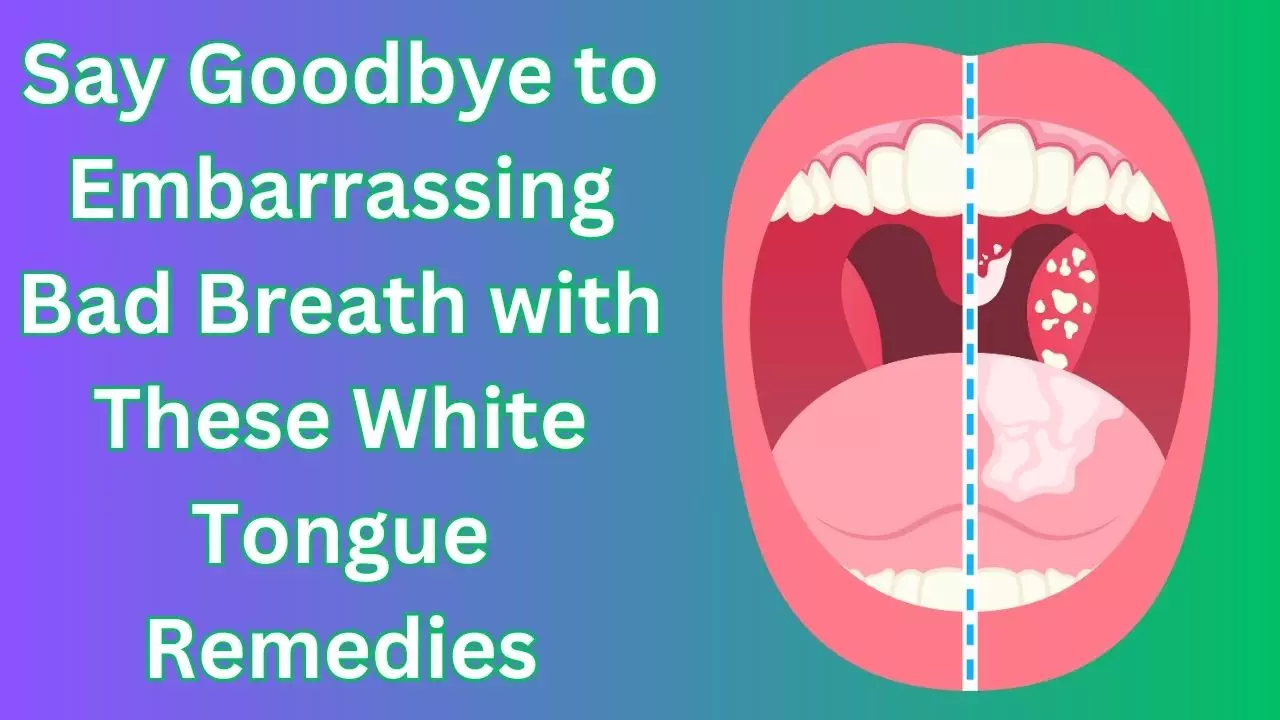
- Brushing Your Tongue: A Simple Solution to White Tongue and Bad Breath
- Oil Pulling: An Ancient Ayurvedic Practice for Oral Health
- Tongue Scraping: An Effective Method for Removing Bacteria and Debris
- Salt Water Rinse: A Natural Antiseptic for a Healthy Mouth
- Baking Soda: A Versatile Remedy for Fresh Breath and White Tongue
- Probiotics: Promoting Good Bacteria for Oral Health
- Herbal Remedies: Harnessing the Power of Nature for a Clean Mouth
- Hydration: Keeping Your Mouth Moist and Free from Odor
- Avoiding Triggers: Foods and Habits that Contribute to Bad Breath and White Tongue
- Incorporating White Tongue Remedies into Your Oral Care Routine
Bad breath, also known as halitosis, is a common problem that affects many people. It can be embarrassing and can have a negative impact on your self-confidence and social interactions. One of the main causes of bad breath is poor oral hygiene. When we don’t brush and floss regularly, bacteria can build up in our mouths, leading to unpleasant odors.
Another common cause of bad breath is dry mouth, also known as xerostomia. Saliva plays an important role in keeping our mouths clean and moist. When we have a dry mouth, bacteria can thrive and produce foul-smelling compounds.
White tongue, on the other hand, is a condition where the surface of the tongue appears white or coated. It is often caused by an accumulation of dead cells, bacteria, and debris on the tongue. Poor oral hygiene, dry mouth, certain foods, and habits like smoking can contribute to the development of white tongue.
Brushing Your Tongue: A Simple Solution to White Tongue and Bad Breath
Brushing your tongue is a simple yet effective way to eliminate bacteria and debris that cause bad breath and white tongue. Many people focus solely on brushing their teeth and neglect their tongues, but the tongue harbors a significant amount of bacteria that can contribute to bad breath.
To brush your tongue, use a toothbrush with soft bristles or a tongue scraper. Gently brush or scrape the surface of your tongue from back to front, rinsing your brush or scraper after each stroke. Be sure to reach the back of your tongue where most of the bacteria reside.
By incorporating tongue brushing into your daily oral hygiene routine, you can significantly reduce the bacteria and debris on your tongue, leading to fresher breath and a cleaner-looking tongue.
Oil Pulling: An Ancient Ayurvedic Practice for Oral Health
Oil pulling is an ancient Ayurvedic practice that involves swishing oil in your mouth for a certain period of time to improve oral health. Traditionally, sesame oil was used, but coconut oil has become a popular choice due to its pleasant taste and antimicrobial properties.
To practice oil pulling, take a tablespoon of oil and swish it around in your mouth for 15-20 minutes. Make sure to move the oil around all areas of your mouth, including your teeth, gums, and tongue. After the designated time, spit out the oil and rinse your mouth with water.
Oil pulling is believed to help remove bacteria and toxins from the mouth, promoting oral health and fresh breath. It can also help moisturize the mouth, reducing the risk of dry mouth and white tongue.
Tongue Scraping: An Effective Method for Removing Bacteria and Debris
Tongue scraping is another effective method for removing bacteria and debris from the tongue. It involves using a tongue scraper, which is a small tool with a curved edge, to gently scrape the surface of the tongue.
To use a tongue scraper, hold the ends of the scraper with both hands and place it at the back of your tongue. Gently pull the scraper forward, applying light pressure to remove any buildup on the surface of your tongue. Rinse the scraper after each stroke to remove any debris.
Tongue scraping can help remove bacteria, dead cells, and food particles that contribute to bad breath and white tongue. It can also improve taste perception and overall oral hygiene.
Salt Water Rinse: A Natural Antiseptic for a Healthy Mouth
A salt water rinse is a simple and natural remedy that can help kill bacteria in the mouth and promote a healthy oral environment. Salt has antimicrobial properties that can help reduce bacteria and inflammation in the mouth.
To make a salt water rinse, dissolve half a teaspoon of salt in a cup of warm water. Swish the solution around in your mouth for 30 seconds to a minute, making sure to reach all areas, including your tongue. Spit out the solution and rinse your mouth with plain water.
Using a salt water rinse regularly can help reduce bacteria in the mouth, freshen breath, and promote a healthy oral environment. It is especially beneficial for those with gum inflammation or infections.
Baking Soda: A Versatile Remedy for Fresh Breath and White Tongue
Baking soda, also known as sodium bicarbonate, is a versatile remedy that can help freshen breath and eliminate white tongue. It has natural deodorizing properties and can help neutralize odors in the mouth.
To use baking soda for fresh breath and white tongue, mix half a teaspoon of baking soda with a cup of warm water. Swish the solution around in your mouth for 30 seconds to a minute, focusing on your tongue. Spit out the solution and rinse your mouth with plain water.
Baking soda can help remove bacteria and debris from the tongue, reducing the risk of bad breath and white tongue. It can also help balance the pH level in the mouth, creating an environment that is less favorable for bacteria to thrive.
Probiotics: Promoting Good Bacteria for Oral Health
Probiotics are beneficial bacteria that can help promote good oral health. They can help balance the oral microbiome, reducing the growth of harmful bacteria that contribute to bad breath and white tongue.
Probiotics can be found in certain foods like yogurt, kefir, sauerkraut, and kimchi. They can also be taken as supplements in capsule or powder form.
By incorporating probiotics into your diet or taking them as supplements, you can help promote a healthy balance of bacteria in your mouth. This can lead to fresher breath and a reduced risk of white tongue.
Herbal Remedies: Harnessing the Power of Nature for a Clean Mouth
Herbal remedies can be a natural and effective way to maintain a clean and healthy mouth. Certain herbs have antimicrobial properties that can help kill bacteria and freshen breath.
Peppermint is one such herb that is commonly used for oral health. It has a refreshing taste and can help mask bad breath. Peppermint oil can be added to toothpaste or mouthwash, or you can chew on fresh peppermint leaves.
Tea tree oil is another herbal remedy that has antimicrobial properties. It can help kill bacteria in the mouth and reduce inflammation. You can add a few drops of tea tree oil to water and use it as a mouthwash, or look for toothpaste or mouthwash that contains tea tree oil.
By incorporating herbal remedies into your oral care routine, you can harness the power of nature to maintain a clean and healthy mouth.
Hydration: Keeping Your Mouth Moist and Free from Odor
Staying hydrated is crucial for maintaining good oral health and preventing bad breath and white tongue. When we are dehydrated, our mouths produce less saliva, leading to dry mouth.
Saliva plays an important role in keeping our mouths clean and moist. It helps wash away bacteria, food particles, and dead cells, reducing the risk of bad breath and white tongue.
To stay hydrated, drink plenty of water throughout the day. Limit your intake of caffeinated beverages and alcohol, as they can contribute to dehydration. Chewing sugar-free gum or sucking on sugar-free candies can also help stimulate saliva production.
By staying hydrated, you can keep your mouth moist and free from odor-causing bacteria.
Avoiding Triggers: Foods and Habits that Contribute to Bad Breath and White Tongue
Certain foods and habits can contribute to bad breath and white tongue. It’s important to be aware of these triggers and make changes to your diet and lifestyle to improve your oral health.
Foods like garlic, onions, and spicy foods can leave a lingering odor in the mouth. Avoiding or minimizing the consumption of these foods can help reduce bad breath.
Smoking is another habit that can contribute to bad breath and white tongue. Smoking not only leaves a foul odor in the mouth but also dries out the mouth, leading to an increased risk of bacteria buildup and white tongue. Quitting smoking can greatly improve your oral health and overall well-being.
Alcohol consumption can also contribute to bad breath. Alcohol has a drying effect on the mouth, reducing saliva production and increasing the risk of bacteria buildup. Limiting your alcohol intake or avoiding it altogether can help improve your oral health.
By avoiding triggers that contribute to bad breath and white tongue, you can significantly improve your oral health and overall well-being.
Incorporating White Tongue Remedies into Your Oral Care Routine
Incorporating white tongue remedies into your oral care routine is essential for maintaining a clean and healthy mouth. By brushing your tongue, practicing oil pulling, using a tongue scraper, rinsing with salt water, using baking soda, taking probiotics, using herbal remedies, staying hydrated, and avoiding triggers, you can significantly reduce the risk of bad breath and white tongue.
Remember to brush your teeth at least twice a day, floss daily, and visit your dentist regularly for check-ups and cleanings. These practices, combined with the white tongue remedies discussed, will help ensure optimal oral health and fresh breath.
Take control of your oral health today by incorporating these remedies into your daily routine. Your mouth will thank you!











